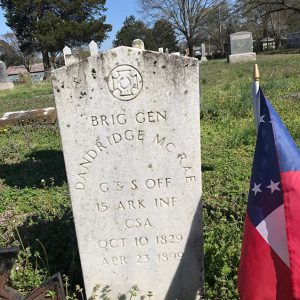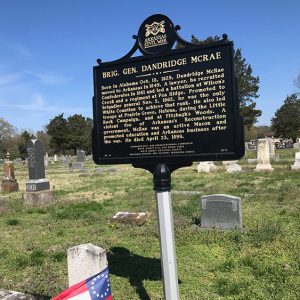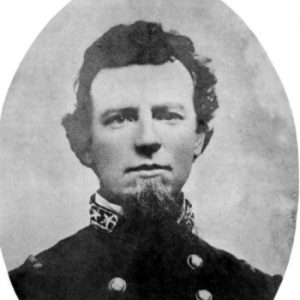calsfoundation@cals.org
Dandridge McRae (1829–1899)
Dandridge McRae was a Searcy (White County) attorney who during the Civil War rose to the rank of brigadier general in the Confederate army and led troops in most of the major battles in Arkansas. Following the war, McRae held various state and federal government positions and was active in promoting the state. The town of McRae (White County) is named in his honor.
Born on October 10, 1829, in Baldwin County, Alabama, Dandridge McRae was the eldest of eleven children born to D. R. W. McRae and Margaret Bracy McRae. His father was a plantation owner, a lawyer, and a member of the Alabama legislature.
Young McRae was tutored on the family plantation. In 1845, he was admitted to South Carolina College, now the University of South Carolina. There, McRae joined a debate club known as the Euphradian Literary Society. He graduated on December 4, 1848, with a BA, the only degree offered by the school at the time. After his father died in 1849, McRae’s mother bought a farm in White County, and he followed her there.
McRae soon moved to Searcy to study law. In 1854, he was admitted to the bar. He practiced law and two years later was elected county and circuit clerk, an office he held for six years. On January 10, 1855, McRae married Angie Lewis of Mississippi. They had four children. Their daughters, Annie and Minnie, were their only children to reach adulthood; their sons died young.
At the outbreak of the Civil War, McRae was the state inspector general and began organizing and swearing in troops. He quickly rose through the ranks to lieutenant colonel and commanded a battalion of Arkansas infantry in the Confederate victory at Wilson’s Creek on August 10, 1861. That winter, his battalion became a regiment, the Twenty-first Arkansas Infantry. McRae led this regiment in the Battle of Pea Ridge (Benton County) on March 7–8, 1862. Afterward, he raised another regiment, the Twenty-sixth Arkansas Infantry. McRae was promoted to brigadier general on November 5, 1862. He commanded a brigade during the December 7, 1862, Battle of Prairie Grove (Washington County) and at Helena (Phillips County) on July 4, 1863.
Following the Battle of Helena, General Theophilus H. Holmes, the Confederate commander at Helena, accused McRae of “misbehavior before the enemy” for allegedly failing to make an attack. A court of inquiry disagreed, clearing McRae of all charges. McRae also was a part of engagements at Hill’s Plantation (Woodruff County) on July 7, 1862, and Fitzhugh’s Woods (Woodruff County) on April 1, 1864. After the war, McRae returned to Searcy and resumed his law practice, which he continued until 1881, when he became deputy secretary of state.
McRae was a Mason, president of the board of trustees of the Searcy Male and Female College, commissioner for Arkansas at the 1886 World’s Fair in New Orleans, and vice president of the State Bureau of Information. In 1888, the U.S. Treasury Department hired him as an expert for gathering information.
The most controversial event in McRae’s life was his involvement in the Ku Klux Klan (KKK). In 1868, Governor Powell Clayton sent secret agent Albert Parker to Searcy to investigate Klan activity. Parker learned too much and was murdered to protect Klan secrets. A confession by one of the participants pointed the blame at McRae and others. A bounty of $500 and an arrest warrant were issued for McRae with the charge of accessory to murder. He fled to Woodruff County, where he stayed with a friend, but came out of hiding when state Democratic officials agreed not to support a candidate in the 1872 election in exchange for McRae’s acquittal. The jury found McRae and his co-defendant innocent.
McRae suffered a stroke in 1897 and remained mentally sound but declined physically until he died on April 23, 1899. He is buried at Oak Grove Cemetery in Searcy.
For additional information:
Clayton, Powell. The Aftermath of the Civil War in Arkansas. New York: Neale Publishing, 1915. Online at https://www.loc.gov/item/15004463/ (accessed March 6, 2024).
Thompson, Alan. “‘Frank and out spoken in my disposition’: The Wartime Letters of Confederate General Dandridge McRae.” Arkansas Historical Quarterly 72 (Winter 2013): 333–365.
Muncy, Raymond Lee. Searcy Arkansas: A Frontier Town Grows Up With America. Searcy, AR: Harding University Press, 1976.
Warner, Ezra. Generals in Gray. Baton Rouge: Louisiana State University Press, 1983.
Alan Thompson
Prairie Grove Battlefield State Park







Comments
No comments on this entry yet.